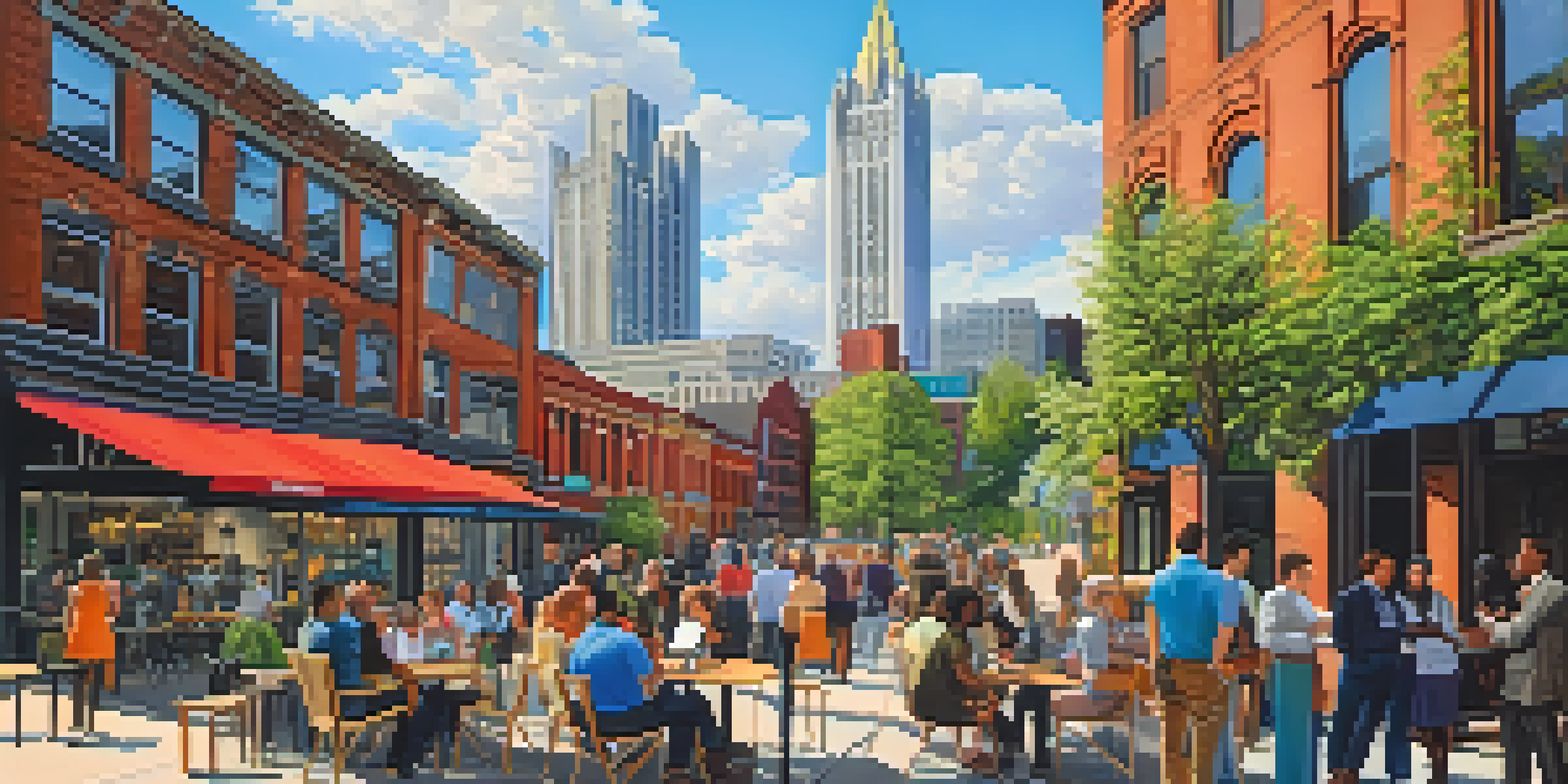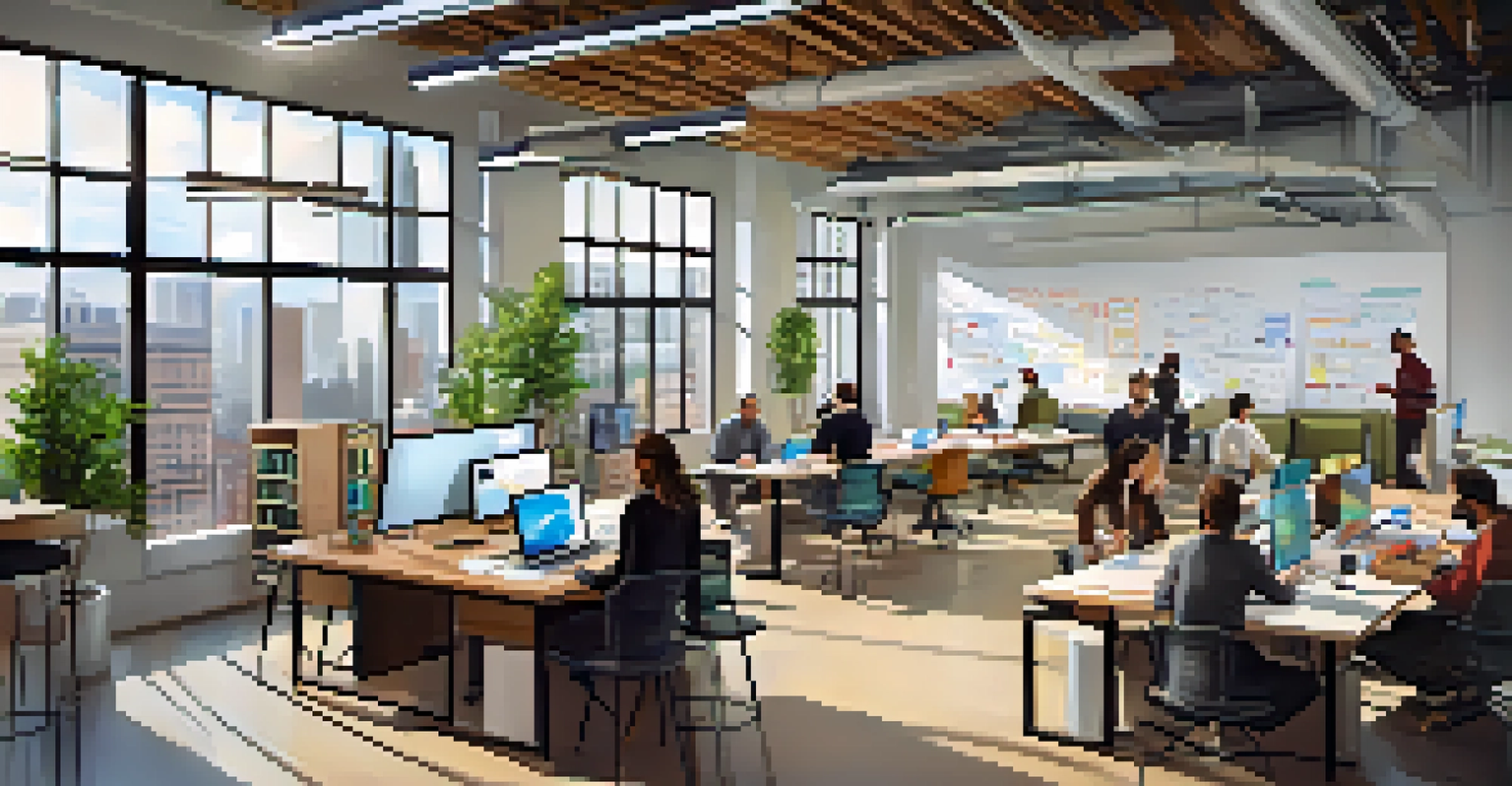Revitalization Efforts: Pittsburgh's Transition from Steel to Tech

The Steel City: Pittsburgh's Industrial Legacy
For much of the 20th century, Pittsburgh was synonymous with steel. The city thrived as a powerhouse of industrial manufacturing, attracting workers from various backgrounds. This prosperity, however, came at a cost, as environmental degradation and economic dependency on a single industry began to take their toll.
The only way to make sense out of change is to plunge into it, move with it, and join the dance.
By the late 1970s, the steel industry faced massive declines due to global competition and shifts in manufacturing practices. As steel mills closed, the city grappled with job losses and urban decay. Yet, this challenging period also laid the groundwork for a remarkable transformation.
The decline of steel forced Pittsburgh to rethink its identity, sparking a movement towards diversification and innovation. The resilience of its citizens set the stage for a new chapter, one that would redefine the city's future.
The Birth of the Tech Ecosystem
As the steel industry waned, Pittsburgh began to cultivate a vibrant tech ecosystem. Local universities, particularly Carnegie Mellon University, played a critical role in this transition by focusing on research and technology. This academic emphasis not only produced skilled graduates but also attracted tech companies looking for talent and innovation.

Startups began sprouting throughout the city, leveraging its rich intellectual resources. Initiatives like the Pittsburgh Technology Council emerged to support these fledgling businesses, fostering collaboration and growth. The shift from steel to tech was not just about new industries; it was about rebuilding the city's spirit.
Pittsburgh's Shift to Tech Innovation
As the steel industry declined, Pittsburgh embraced technology, transforming its workforce and economy.
Pittsburgh's embrace of technology created a ripple effect, leading to the development of cutting-edge fields such as robotics, artificial intelligence, and healthcare technology. This transformation positioned the city as a leader in the tech sector, showcasing its adaptability and forward-thinking mindset.
Revitalizing Urban Spaces: The Role of Innovation
The revitalization of Pittsburgh extended beyond just industries; it involved reimagining urban spaces. Abandoned steel mills and warehouses were transformed into modern office spaces, tech hubs, and innovation districts. Places like the Strip District became bustling centers for entrepreneurship and creativity.
Innovation distinguishes between a leader and a follower.
This urban renaissance attracted not only tech companies but also investors and talent from across the nation. The city’s commitment to innovation encouraged collaboration between startups, established businesses, and educational institutions. This synergy created an environment rich in opportunities and ideas.
Moreover, the focus on sustainable development ensured that the revitalization was not just about economic growth but also about improving the quality of life for residents. Parks, public spaces, and community initiatives emerged, reflecting a holistic approach to urban renewal.
Community Engagement: Key to Successful Transition
A crucial aspect of Pittsburgh's transformation has been community engagement. Local residents, businesses, and organizations actively participated in shaping the new narrative of their city. This collaborative spirit fostered a sense of ownership and pride among Pittsburghers.
Engagement initiatives included public forums, workshops, and community-led projects that encouraged dialogue and input. By listening to the voices of those most affected by the changes, the city was able to create solutions that addressed real needs. This grassroots approach helped to build trust and cohesion within the community.
Community Engagement Drives Change
Active participation from residents and local organizations has been crucial in shaping Pittsburgh's new identity as a tech hub.
As a result, residents became advocates for their city, promoting its new identity as a tech hub. This collective effort not only enhanced the city’s image but also strengthened social bonds, making Pittsburgh a more connected and vibrant place to live.
The Role of Education in Pittsburgh's Tech Growth
Education has been a cornerstone of Pittsburgh's shift towards technology. Local universities are not just breeding grounds for talent; they actively collaborate with businesses to ensure that students are equipped with relevant skills. Programs tailored to emerging tech fields have become increasingly popular, driving enrollment and interest.
Internship and co-op opportunities provided by local companies give students hands-on experience, bridging the gap between academia and the workforce. This practical exposure allows graduates to seamlessly transition into careers in tech, fueling the industry with fresh ideas and innovation.
Additionally, community colleges and training programs have emerged to cater to non-traditional students and those looking to upskill. By prioritizing education and continuous learning, Pittsburgh is securing its position as a competitive player in the tech landscape.
Pittsburgh's Tech Giants: Leaders in Innovation
As Pittsburgh evolved into a tech hub, several notable companies established their presence in the city. Firms like Google, Uber, and Facebook recognized the potential of Pittsburgh’s talented workforce and invested in local offices. Their presence not only brought jobs but also elevated the city’s profile on the national tech stage.
These tech giants often collaborate with local startups and universities, creating a dynamic ecosystem of innovation. Initiatives such as hackathons and incubators encourage idea-sharing and foster a culture of experimentation. This collaborative spirit propels the city forward, making it a hotbed for technological advancements.
Education Fuels Tech Growth
Local universities play a vital role in equipping students with the skills needed for the emerging tech landscape.
Moreover, Pittsburgh's emphasis on responsible tech development has attracted attention from investors and thought leaders. As these companies focus on ethical practices, they contribute to a narrative that positions Pittsburgh not just as a tech leader but as a model for sustainable development.
Looking Ahead: The Future of Pittsburgh's Tech Scene
Pittsburgh's transition from steel to tech is just the beginning of a bright future. The city continues to invest in infrastructure and policies that support innovation and entrepreneurship. As more companies and individuals flock to Pittsburgh for its opportunities, the potential for growth is enormous.
Emerging technologies such as artificial intelligence, blockchain, and clean energy are at the forefront of this new chapter. With a strong foundation built on education, community engagement, and collaboration, Pittsburgh is poised to become a leader in these industries. The future looks promising as the city embraces change and innovation.

Pittsburgh's journey serves as an inspiring reminder of resilience and adaptability. By harnessing the lessons of its past and focusing on a tech-driven future, the Steel City is transforming into a beacon of hope and progress in the 21st century.